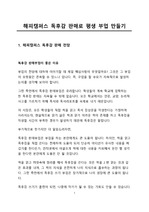미토콘드리아 DNA의 염기서열을 이용한 파파리반딧불이, 애반딧불이 및 늦반딧불이(딱벙벌레목: 반딧불이과)의 유전적 분화 및 계동적 관련
(주)코리아스칼라
- 최초 등록일
- 2016.04.01
- 최종 저작일
- 2000.12
- 16페이지/
 어도비 PDF
어도비 PDF
- 가격 4,900원

* 본 문서는 배포용으로 복사 및 편집이 불가합니다.
서지정보
ㆍ발행기관 : 한국응용곤충학회
ㆍ수록지정보 : 한국응용곤충학회지 / 39권 / 4호
ㆍ저자명 : 김익수, 이상철, 배진식, 진병래, 김삼은, 김종길, 윤형주, 양성렬, 임수호, 손흥대
한국어 초록
본 연구는 파파리반딧불이 (Hotaria papcrinsis), 애반딧불이 (Luciola lateralis) 및 늦반딧 불이 (Pyrocoelia fufa)등 국내 주요 반딧불이 종의 유전적 분화 및 계통분류학적 관련을 파악하고자 하였다. 이를 위하여 mtDNA의 COI유전자 및 16S rRNA유전자 일부의 염기서열 (각 403bp 및 490bp~504bp)을 분석하였으며 아울러 GenBank에 등록된 일본 반딧불이 29종(반딧불이과 27종, 홍반딧과 1종 및 Rhagophthalmus과 1종)의 16S rRNA유전자의 동일부위 염기서열을 사용하였다. 국내 세 종간의 COI및 16S rRNA유전자의 염기서열 그리고 COI유전자의 아미노산 분화정도를 비교한 결과, 반딧불이아과(Lampyrinae)의 늦반딧불이는 애반딧불이아과(Luciolinae)에 공통적으로 속해있는 애반딧불이 및 파파리반딧불이와 다소 큰 유전적 차이를 나타냄으로 기존의 분류학적 위치를 확인하였다. 16S rRNA유전자의 염기서열을 이용, PAUP과 PHYLIP에 의한 계통분류학적 분석 결과, 우리 나라 애반딧불이는 일본 애반딧불이와 강력한 단일그룹을 형성하였으나 이들간 상당한 유전적 차이 (2.9%의 16S rRNA유전자 염기분화율)를 보였다. 국내 두 지역의 파파리반딧불이는 일본 대마도 고유종인 H. tsushimana와 같은 계통그룹을 형성하였으므로 Hotaria란 속명의 사용이 타당해 보이나 파파리반딧불이는 지역 개체간 자매분류군을 형성하지 않으므로 이에 대한 추가 연구가 요망되는 실정이다. 마지막으로, 국내 늦반딧불이 지역 개체가 일본 늦반딧불이와 강력한 단일 계통그룹을 형성한 점으로 미루어 Pyrocoelia란 속명의 사용은 타당해 보이나 다른 모든 늦반딧불이로부터 큰 유전적 거리론 보인 제주도 개체에 대한 추가적인 연구가 요망되는 실정이다. 결론적으로, 국내 반딧불이 종들은 일본에서 공통적으로 발생하는 반딧불이종 또는 속과 아주 강력한 계통그룹을 형성하였으므로 기존의 계통관련 연구를 지지하고 있는 실정이다.
영어 초록
Genetic divergence and phylogenetic relationships among the major Korean fireflies (Hotaria papariensis, Luciola lateralis, and Pyrocoelia rufa) were studied. A portion of mitochondrial COI (403 bp) and 165 rRNA (490~504 bp) genes were sequenced, and the GenBank-registered, homologous 165 rRNA sequences of Japanese fireflies were compared (27 species of Lampyridae, one of Lycidae, and one of Rhgophthalmidae). Greatest DNA and/or amino acid sequence divergence was found when P rufa, belonging to Lampyrinae was compared with H. papariensis and L. lateralis, both belong-ing to Luciolinae, confirming the current taxonomic status of the species. In the PAUP and PHYLIP analyses with 165 rRNA data, grouping of the two geographic samples of H. papariensis with H. tsushimana validate the use of generic name, Hotaria. Nevertheless, lack of sister-group relationship of the two geographic samples of H. papariensis renders further investigation on this group . Although the Korean and Japanese L. lateralis formed a strong monophyletic group, a substantial genetic differentiation was detected between them (2.9% of 165 rRNA gene sequence divergence). Finally, the geographic samples of Korean p. rufa strongly formed a group with Japanese p. rufa, warranting the use of generic name, Pyrocoelia, but the genetic distance observed between the Cheju-Island individual and all others requires further investigation on this subject. Summarized, this study supports the current taxonomic status of the Korean fireflies in that each respectively formed a strong monophyletic group with its own species or genus.
참고 자료
없음
"한국응용곤충학회지"의 다른 논문
더보기 (3/8)

















